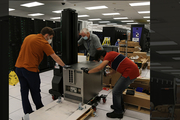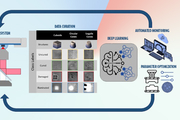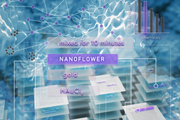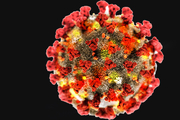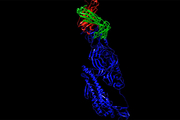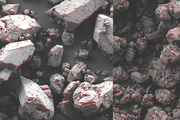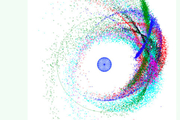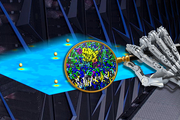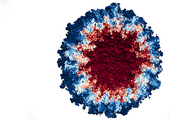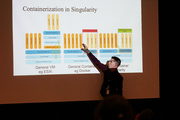Did you know we have a monthly newsletter? View past volumes and subscribe.
LLNL pairs world’s largest computer chip from Cerebras with Lassen to advance machine learning, AI research
Aug. 19, 2020 -
LLNL and artificial intelligence (AI) computer company Cerebras Systems have integrated the world’s largest computer chip into the NNSA’) Lassen system, upgrading the top-tier supercomputer with cutting-edge AI technology. Technicians recently completed connecting the Silicon Valley-based company’s massive, 1.2 trillion transistor Wafer-Scale Engine chip—designed specifically for machine...
Advancing healthcare with data science (VIDEO)
Aug. 3, 2020 -
This video provides an overview of projects in which data scientists work with domain scientists to address major challenges in healthcare. To help fight the COVID-19 pandemic, researchers are developing computer models to search for potential antibody and antiviral drug treatments, sharing a data portal with scientists and the general public, and analyzing drug compounds via a novel text...
Software integration of AI accelerators in HPC (VIDEO)
July 31, 2020 -
In this episode of Next Platform TV, LLNL's Brian Van Essen talks about AI accelerator integration in HPC systems and software stacks. His interview begins at timestamp 27:57. Watch on YouTube.
Machine learning model may perfect 3D nanoprinting
July 29, 2020 -
Two-photon lithography (TPL)—a widely used 3D nanoprinting technique that uses laser light to create 3D objects—has shown promise in research applications but has yet to achieve widespread industry acceptance due to limitations on large-scale part production and time-intensive setup. LLNL scientists and collaborators turned to machine learning to address two key barriers to industrialization...
Lockdown doesn’t hinder annual Data Science Challenge
June 26, 2020 -
Due to the COVID-19 pandemic and shelter-in-place restrictions, this year’s Data Science Challenge with the University of California, Merced was an all-virtual offering. The two-week challenge involved 21 UC Merced students who worked from their homes through video conferencing and chat programs to develop machine learning models capable of differentiating potentially explosive materials from...
Carnegie Live: high energy density science and AI (VIDEO)
June 9, 2020 -
In this Carnegie Live video, Seiichi Shimasaki, Science Counselor for the Japanese embassy in the U.S., described a multiyear science research program (nicknamed the “Moonshot”) to develop new technologies that help solve some of society’s most pressing challenges. He explained that the Government of Japan was looking for a data science program to mentor young scientists, which led to the...
Lab team studies calibrated AI and deep learning models to more reliably diagnose and treat disease
May 29, 2020 -
A team led by LLNL computer scientist Jay Thiagarajan has developed a new approach for improving the reliability of artificial intelligence and deep learning-based models used for critical applications, such as health care. Thiagarajan recently applied the method to study chest X-ray images of patients diagnosed with COVID-19, arising due to the novel SARS-Cov-2 coronavirus. Read more at LLNL...
AI identifies change in microstructure in aging materials
May 26, 2020 -
LLNL scientists have taken a step forward in the design of future materials with improved performance by analyzing its microstructure using AI. The work recently appeared online in the journal Computational Materials Science. Read more at LLNL News.
AI hardware for future HPC systems (VIDEO)
May 20, 2020 -
This interview with Brian Spears, who leads cognitive simulations at LLNL, covers the current state of evaluation of AI chips and how those will mesh with existing and future HPC systems. Watch on YouTube.
COVID-19 research goes public through new portal
May 18, 2020 -
A new online data portal is making available to the public a wealth of data LLNL scientists have gathered from their ongoing COVID-19 molecular design projects, particularly the computer-based “virtual” screening of small molecules and designed antibodies for interactions with the SARS-CoV-2 virus for drug design purposes. The portal houses a wealth of data LLNL scientists have gathered from...
Interpretable AI in healthcare (PODCAST)
May 17, 2020 -
LLNL's Jay Thiagarajan joins the Data Skeptic podcast to discuss his recent paper "Calibrating Healthcare AI: Towards Reliable and Interpretable Deep Predictive Models." The episode runs 35:50. Listen at Data Skeptic.
Building knowledge and insights using machine learning of scientific articles
May 5, 2020 -
Nanomaterials are widely used at LLNL and in industry for many applications from catalysis to optics to additive manufacturing. The combination of nanomaterials’ shape, size, and composition can impart unique optical, electrical, mechanical, or catalytic properties needed for a specific application. However, synthesizing a specific nanomaterial and scaling up its production is often...
LLNL creates web resources to aid in fight against COVID-19
March 30, 2020 -
LLNL is fully committed to helping protect the U.S. from COVID-19 and to speed the recovery of those affected. As a world-class research institute, we have considerable infrastructure, unique research capabilities and a dedicated team of scientists and engineers supporting the fight against the COVID-19 pandemic. Our current COVID-19 research and response activities are focused on four broad...
Lab antibody, anti-viral research aids COVID-19 response
March 26, 2020 -
LLNL scientists are contributing to the global fight against COVID-19 by combining artificial intelligence/machine learning, bioinformatics and supercomputing to help discover candidates for new antibodies and pharmaceutical drugs to combat the disease. Armed with the virus’ predicted 3D structure and a few antibodies known to bind and neutralize SARS, an LLNL team led by Daniel Faissol and...
Machine learning accelerates high-performance materials development
Feb. 13, 2020 -
Lawrence Livermore National Laboratory (LLNL) and its partners rely on timely development and deployment of diverse materials to support a variety of national security missions. However, materials development and deployment can take many years from initial discovery of a new material to deployment at scale. Now, an interdisciplinary team of LLNL researchers from the Physical and Life Sciences...
Department of Energy researchers share data management strategies at first-ever “Data Day”
Nov. 11, 2019 -
It’s become something of a mantra of the digital age: Data is the new currency. Especially in science, where it’s hard to find a single project that doesn’t involve generating or consuming massive amounts of data.
In light of the growing awareness of the critical importance of data management across the Department of Energy complex, more than 100 researchers from DOE national laboratories...
Big data illuminates the physical sciences
Nov. 6, 2019 -
Livermore teams are applying innovative data analysis and interpretation techniques to advance fundamental science research. This article describes projects in astrophysics and materials science. Read more at Science & Technology Review.
Lab leads effort to model proteins tied to cancer
Oct. 31, 2019 -
Computational scientists, biophysicists and statisticians from LLNL and Los Alamos National Laboratory(LANL) are leading a massive multi-institutional collaboration that has developed a machine learning-based simulation for next-generation supercomputers capable of modeling protein interactions and mutations that play a role in many forms of cancer. Read more at LLNL News.
Successful simulation and visualization coupling proves the power of Sierra
Oct. 22, 2019 -
As the first National Nuclear Security Administration (NNSA) production supercomputer backed by GPU- (graphics processing unit) accelerated architecture, Sierra’s acquisition required a fundamental shift in how scientists at Lawrence Livermore National Laboratory (LLNL) program their codes to take advantage of the GPUs.
The majority of Sierra’s computational power—95 percent of its 125...
Learning about learning: reading group discusses advancements in AI
Oct. 2, 2019 -
Teams from around Lawrence Livermore conduct research using artificial intelligence, and the Data Science Institute’s (DSI’s) Machine Learning Reading Group serves as a resource for employees to keep one another apprised of developments in this ever-changing field.
The group meets weekly to share and discuss new literature on machine learning and deep learning, subsets of artificial...

